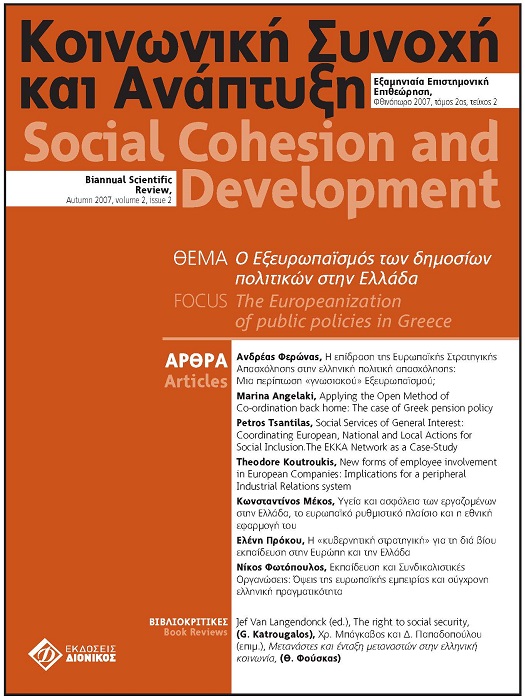The impact of European Employment Strategy on Greek employment policy: a case of cognitive Europeanisation

Abstract
Τhis article examines the role of OMC, as a ‘soft’ mode of governance, in the Europeanisation of national policies is examined. Recent OMC bibliography highlights its cognitive effects, suggesting that the level of its influence varies nationally according to country and welfare regime and depends on the distance between national sociopolitical situation and European requirements. The examination of some aspects of the impact of European Employment Strategy on Greek employment policy, that follows as a case study, confirms to a large extent the aforementioned hypothesis. In addition, it shows that Europeanisation through OMC in some cases might be stronger and lead to some degree of convergence in policy outcomes.
Article Details
- How to Cite
-
Φερώνας Α. (2016). The impact of European Employment Strategy on Greek employment policy: a case of cognitive Europeanisation. Social Cohesion and Development, 2(2), 109–127. https://doi.org/10.12681/scad.9045
- Section
- Articles

This work is licensed under a Creative Commons Attribution-NonCommercial-ShareAlike 4.0 International License.
Authors who publish with this journal agree to the following terms:
- Authors retain copyright and grant the journal right of first publication with the work simultaneously licensed under a Creative Commons Attribution Non-Commercial License that allows others to share the work with an acknowledgement of the work's authorship and initial publication in this journal.
- Authors are able to enter into separate, additional contractual arrangements for the non-exclusive distribution of the journal's published version of the work (e.g. post it to an institutional repository or publish it in a book), with an acknowledgement of its initial publication in this journal.
- Authors are permitted and encouraged to post their work online (preferably in institutional repositories or on their website) prior to and during the submission process, as it can lead to productive exchanges, as well as earlier and greater citation of published work (See The Effect of Open Access).


